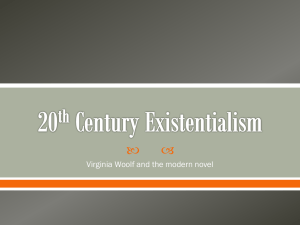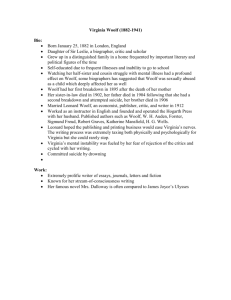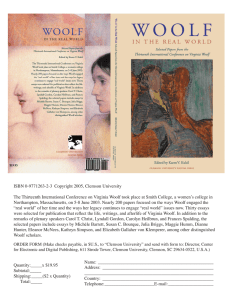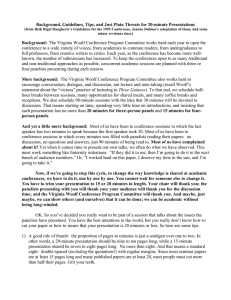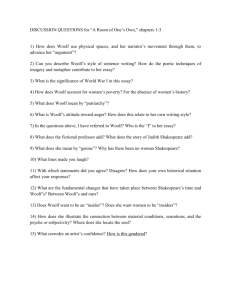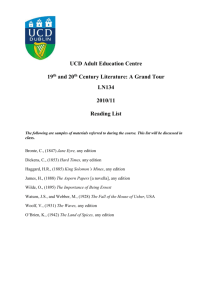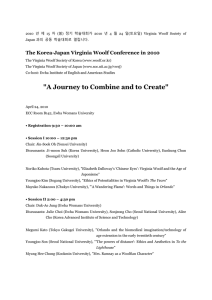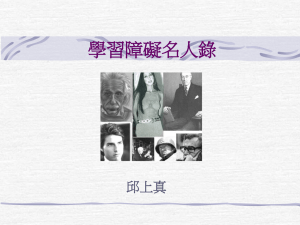To whom much is given, much is expected
advertisement
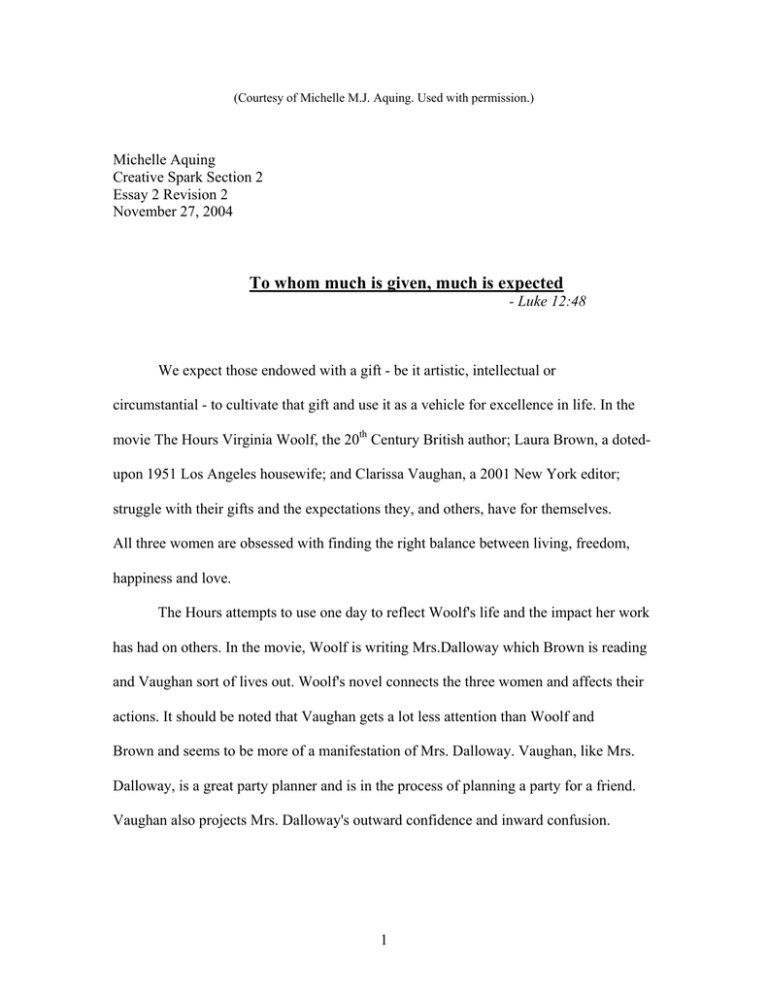
(Courtesy of Michelle M.J. Aquing. Used with permission.) Michelle Aquing Creative Spark Section 2 Essay 2 Revision 2 November 27, 2004 To whom much is given, much is expected - Luke 12:48 We expect those endowed with a gift - be it artistic, intellectual or circumstantial - to cultivate that gift and use it as a vehicle for excellence in life. In the movie The Hours Virginia Woolf, the 20th Century British author; Laura Brown, a dotedupon 1951 Los Angeles housewife; and Clarissa Vaughan, a 2001 New York editor; struggle with their gifts and the expectations they, and others, have for themselves. All three women are obsessed with finding the right balance between living, freedom, happiness and love. The Hours attempts to use one day to reflect Woolf's life and the impact her work has had on others. In the movie, Woolf is writing Mrs.Dalloway which Brown is reading and Vaughan sort of lives out. Woolf's novel connects the three women and affects their actions. It should be noted that Vaughan gets a lot less attention than Woolf and Brown and seems to be more of a manifestation of Mrs. Dalloway. Vaughan, like Mrs. Dalloway, is a great party planner and is in the process of planning a party for a friend. Vaughan also projects Mrs. Dalloway's outward confidence and inward confusion. 1 THE GIFTS AND THEIR PRESSURES A main theme throughout the movie is freedom. All three women actively seek it and at the movie's end each woman chooses what she thinks is best: Woolf drowns herself, Brown leaves her family and Vaughan finally lets go of her longtime friend and past lover, Richard. Each woman's decision, fueled by the circumstances which surround her, is reached after much thought and deliberation. Woolf's concern is Leonard's sanity and happiness. She realizes the great pressure she puts on him and sees her suicide as a way of freeing him from being responsible for her. Brown feels stifled by her doting husband and son and contemplates killing herself and her unborn baby but decides to leave her family after the birth of her child. Vaughan is forced to let go of Richard, at least physically, after he commits suicide. Each woman is under tremendous pressure from both herself and society. Woolf is a literary genius who is expected to develop and share her gift in spite of her illness and fears. Writing for Woolf is a means of expressing and exploring her thoughts: Her writings reflect an attempt to reconcile the dual nature of her sexuality, her unfulfilled desire to bear a child” she often compared the writing process with childbirth” her consuming fear of failure, and an overwhelming sense that she might lose control over her life” (Authors and Artists for Young Adults). Woolf, by simply writing how she felt, has penned works that have been praised as revolutionary and deeply moving. Selfexpression allowed Woolf to tap into her inner self and create her masterpieces. 2 Brown is privileged to have a husband who cherishes her and a son who adores her but she finds herself unhappy in her marriage. She is expected to be the loving and appreciative wife and mother but harbors feelings of incompetence and inferiority. This is aptly shown in the scene in which she attempts to bake a birthday cake for her husband. She expresses feelings of frustration and her incapacity to do something as simple as bake a cake to her neighbor, Kitty Barlowe, who Brown views as good at everything. Ironically the only thing Barlowe cannot do is bear children, something she craves the most. So while Brown envies Barlowe's all-knowing demeanor, Barlowe envies Brown's apparently happy life, especially Brown's ability to bear children. Woolf's novel Mrs. Dalloway which Brown is reading, catches Barlowe's eye and Barlowe eagerly asks what the novel is about. Brown explains: the book is about a woman who throws a party and she appears confident so everyone thinks she is fine but she isn't. As Brown gives this summary the viewer senses that she experiences the same feelings as the protagonist in the novel and this could be a possible reason why she makes the decisions she does; she is not happy. Vaughan, like Mrs. Dalloway, is good at throwing parties and is in the process of planning one in honor of Richard who has been awarded a prize for his literary work. She was renamed Mrs. Dalloway by Richard after their first night together. Since then it has been no looking back for Vaughan. Even though she and Richard both went on to lead homosexual lives, they kept in touch and when Richard contracted the HIV/AIDS virus Vaughan became his caretaker: visiting him often, cleaning his apartment and ensuring he had meals. So she never really lets go of him until he dies. Richard senses Vaughan's dependence on him and remarks to Vaughan that he thinks he is only staying alive to 3 satisfy her. After analyzing his statement, Vaughan admits to her daughter, Julia, that she feels happy and useful only with Richard. After Richard's suicide Vaughan has to figure out what makes her happy. HAPPINESS In The Hours director Stephen Daldry sought to portray “how people lived their lives and the acute and profound choices people make and the cost of these choices in the search for happiness” (The Hours DVD Extras). This is aptly displayed by Brown and her choices. The movie allows the viewer to see Brown weighing her options and the effect her final decisions has on her son, Richard, and the effect he has on others. Woolf writes what she feels in an effort to identify and clarify what she feels and stands for. What she writes in her books reaches millions of readers like Brown who ponder on her work and draw on it for some sort of guidance and solace. Through each problematic and stressful situation the main characters (Woolf, Brown, Vaughan, Leornard Woolf and Richard) try to focus on their own happiness and contentment; something Daldry calls “the light at the end of a very dark tunnel (DVD Extras)”. For Woolf, her dark tunnel was her battle with depression. Her happiness was found in the process of writing which was ironically a taxing process for her (Authors and Artists). She was an experimental writer and her novels “demand engagement from a reader with the novel's structure as well as with its content” (Gay and Lesbian Biography). Woolf thought deeply about the content of her work and strove to instill 4 some experimental element in each piece (Concise Dictionary of British Literary Biography). For Brown it is unclear what makes her happy until the end of the movie when she is speaking with Vaughan. Brown tries to justify why she left her family: “It was death, I chose life.” Woolf also makes this choice. One of the most moving scenes in The Hours was on the railway platform where Leonard Woolf finds Woolf sitting on a bench after she left the house without telling him. Here Woolf confesses her feelings of confinement in Richmond and expresses her longing for the upbeat life of London and her right to choose the path of her life: “This is my right - the right of every human beingeven the very lowest has the right to choose by which she defines her humanity. I wish for your sake, Leonard, I can be happy in this quietness. If it is between Richmond and death, I choose death.” Leonard Woolf eventually succumbs to her wishes and agrees to move back to London. But Woolf eventually does choose death and drowns herself in the River Ouse after giving up on the battle with the voices in her head. INSIDE WOOLF'S HEAD AND HEART The voices in Woolf's head originate from her mental condition which worsened as she aged. Woolf's living conditions as a child coupled with her family's history of illness is believed to have contributed to her fragile nature. Her first mental breakdown occurred when her mother died. Many Woolf biographers report that shortly after her mother's death her half brother, George Duckworth, her mother's first child by a different marriage, began to sexually abuse her. Shortly after her mother's death, Stella, 5 George's sister, died after a long illness. A mere two years later Leslie Stephen, Woolf's father, died with Woolf experiencing another mental collapse after his death. Woolf was further devastated by the death of her beloved brother Thoby shortly after which her sister, Vanessa, married, leaving Woolf virtually alone although she lived with younger brother, Adrian. Woolf finally found some stability with Leonard Woolf after concerned friends encouraged the marriage. Although their marriage was not a sexual one it was a deeply intellectual one (Feminist Writers) which propelled Woolf as an author. Often in The Hours Leonard Woolf's care and concern for Woolf can be seen: he gently prompts her to eat, he encourages her to sleep, he respects her wishes to move to London although he thinks it will hurt Woolf more than help. The Hours shows Woolf drawing ideas and energy from her environment and people around her, something that helped her to develop many of the ideas she uses in her work. After a short walk she rests on a bench and suddenly decides her protagonist will die; she notices flowers in her room and decides to add that into her work. In her writings Woolf also addresses issues that concern her, in particular feminist issues. She was upset that she did not receive a formal education like her brothers and attacks this in her essay A Room of One's Own in which Judith Shakespeare, William Shakespeare's gifted, fictitious sister, is also denied a formal education and is prevented by society from becoming a playwright. Woolf advocated women stepping out of the mold society had set for them. She believed her beloved mother, devoted wife and caregiver, died early from exhaustion because she was so good at being what society expected of her (Feminist Writers). 6 Woolf's style of writing symbolizes her feelings towards women's liberty. Her stream of consciousness method is said to be influenced by James Joyce's Ulysses. This technique records thoughts and feelings of the character without regard to logic and seeks to reflect both the internal and external forces that influence a person psychologically. Despite her plethora of ideas Woolf agonized over each piece of work which led to debilitating headaches and spells of inactivity. She would get an idea in a flash of brilliance and set out to work incessantly on the actual writing of the book (DVD Extras). This writing process as well as the publication of her work and the time spent waiting on the critics' reaction was punctuated by periods of frustration and despair. Peter Gay identifies Woolf's neurosis as the cause for her artistic failure which occurred as often as her important creations. Woolf was often on the verge of madness which ironically was the best times for her ideas. Ideas for new books and plots often filled her mind while she was in this time of great personal pain (Authors and Artists). The Hours presents Woolf emerging from one such low point and goes on to show how she spends a typical day while writing Mrs. Dalloway. What excites Woolf the most is her sister's visit. Vanessa has always been Woolf's best friend and source of comfort so it pains Woolf to see her sister leave. Just before Vanessa departs Woolf clutches her and shares a kiss with her that leaves Vanessa speechless. Michael Cunningham, author of the novel The Hours on which the movie was based, and The Hours' director, Stephen Daldry, both commented that this kiss represents Woolf's hunger for life (DVD Extras). Woolf envies Vanessa's seemingly happy life filled with the joy of children and London. They claim that this kiss was a physical representation of Woolf's 7 emotions - “she feels drained and this kiss represents her efforts to source energy to live (DVD Extras). Brown also shares such a kiss with Barlowe after Barlowe reveals she may be unable to bear children. Brown attempts to comfort Barlowe with a hug which develops into their kiss - “a sort of kiss of assurance. This scene is an example of Brown expressing herself without restriction. Vaughan also kisses her partner, Sally, near the movie's end; a kiss which is expected and an expression of love and support. All three kisses reflect some aspect of Woolf: her search and need for life, her tendency to express her feelings and the constant, gentle support of Leonard Woolf. LEONARD & VIRGINIA Leonard Woolf may arguably be the best thing that happened to Woolf. His unfailing support, concern and care for Virginia served as a springboard for the publication of her greatest works. Throughout their life together, Leonard Woolf busied himself with providing Woolf with a calm, comfortable environment to work in at Richmond. With Woolf he founded the Hogarth Press, their at-home printing press, in an effort to free her from the added frustration of carrying her work to a publisher. The fact that she had the freedom to write and publish whatever she wished allowed Woolf to explore, experiment, and express her true feelings. She produced a book from thought to publication all in the comfort of her home... but she missed greatly the stimulus of London. 8 Woolf, a social being within the walls of her London home, was an anonymous stranger on the street. She would often walk about listening to the sounds of the city and commented on it in her writings. In her book, Virginia Woolf: A Biography, Hermione Lee gives an example of this: in The Waves Woolf writes: “I stop in London sometimes and hear feet shuffling. That's the language, I think; that's the phrase I should like to catch.(p658)” Woolf liked to observe those around her, she wanted to breathe in all that was around her in an effort to better understand it and therefore express it as the need arose. Her nephew, Quentin Bell, noted in a commentary on The Hours that Woolf would always call him and his brother and quiz them on a number of things (DVD Extras). Woolf was always quizzing, always inquiring; her perceptive nature as an artist was constantly on the prowl for new ideas hidden in an individual's day to day life and the choices made and its eventual effect. The sacrifices Leonard Woolf made as a man, a scholar and an artist for Woolf's comfort did not go unnoticed or unappreciated. In her suicidal note to him, Woolf justifies her suicide as a way to free Leonard Woolf from the burden she had become so that he may live happy. She claimed: “I am doing what seems the best thing to do...If anybody could have saved me it would have been you. Everything has gone form me but the certainty of your goodness. I can't go on spoiling your life any longer. I don't think two people could have been happier than we have been (DVD Extras).” 9 THE ACCURACY OF THE HOURS Michael Cunningham's book does a good job of drawing from Woolf's history and weaving it into the lives of two fictional characters. In an attempt to continue the near accuracy of Cunningham's book, Daldry, and screenwriter, David Hare, developed a movie that efficiently and effectively transcends time to portray the three women, and presents scenes which vividly show each woman's character like the scene on the platform between Woolf and Leonard Woolf and Brown's scene with Barlowe in her kitchen. The actors also helped to make Cunningham's book alive. Nicole Kidman, who received an Academy Award for her outstanding performance as Virginia Woolf, brings to the screen what Daldry refers to as a “[Nicole's] strong emotional depth to herself and a sort of danger about herself.” Kidman's ability as an exceptional actress reveals itself in the movie; she effectively creates a believable Woolf and provides the audience with an insight into Woolf's life. Cunningham and Daldry also praised Julianne Moore, Meryl Streep and Stephen Dillane for their outstanding performances as Brown, Vaughan and Leonard Woolf respectively. The Hours also examines what one's actions reveals about one's character: the way Woolf responds to her husband, the perpetual scowl on Woolf 's face, the simple activity of Vaughan cracking eggs. Daldry identifies this “behavioral language” as the key to learning about the characters and understanding how they think. This is well reflected in the movie. One example is the tea scene in which Woolf is absentmindedly 10 starring into space thinking about Mrs. Dalloway while Vanessa's daughter tries to talk to her. Vanessa explains to her daughter that Woolf lives in two worlds, the real world and the world of her work. Woolf can be said to have always been in a trance, caught up in the moment, concerned only with the matter at hand. After overcoming the initial shock of women sharing somewhat passionate kisses, I realized that I enjoyed The Hours. The intertwining of three women's lives around one woman and her book was quite ingenious and entertaining. Daldry's and Hare's vision and insight developed a movie that contained depth and entertainment. Most importantly I was introduced to Virginia Woolf who has proven to be both an amazing writer and an extraordinary woman. 11 Works Cited * "Virginia Woolf." Authors and Artists for Young Adults, Volume 44. Gale Group, 2002. Reproduced in Biography Resource Center. Farmington Hills, Mich.: The Gale Group. 2004. http://galenet.galegroup.com/servlet/BioRC * "Virginia Woolf." Concise Dictionary of British Literary Biography, Volume 6: Modern Writers, 1914-1945. Gale Research,1991. Reproduced in Biography Resource Center. Farmington Hills, Mich.: The Gale Group. 2004. http://galenet.galegroup.com/servlet/BioRC * "(Adeline) Virginia Woolf." Feminist Writers. St. James Press, 1996.Reproduced in Biography Resource Center. Farmington Hills, Mich.: The Gale Group. 2004. http://galenet.galegroup.com/servlet/BioRC * "Virginia Woolf." Gay & Lesbian Biography. St. James Press, 1997. Reproduced in Biography Resource Center. Farmington Hills, Mich.: The Gale Group. 2004. http://galenet.galegroup.com/servlet/BioRC * Gay, Peter. “On not psychoanalyzing Virginia Woolf.”American Scholar. Spring 2002 * Lee, Hermione. Virginia Woolf: A Biography Chatto and Windus, 1996. * Bell, Quentin. Virginia Woolf: A Biography Harcourt (New York, NY), 1972 * The Hours (The movie) DVD Extras 12
